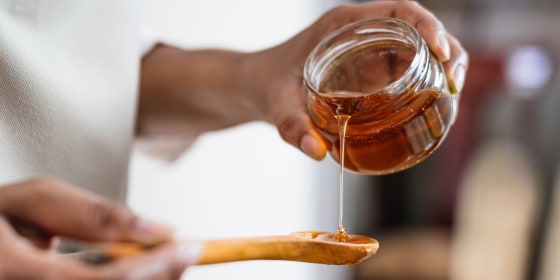$21.99
Amazon
$20.00
Zach & Zoë

If you’re interested in learning whether honey alleviates seasonal allergy symptoms, you or someone you know likely experience some. But what are seasonal allergies?
“A seasonal allergy, also known as “hay fever” or “seasonal allergic rhinitis,” is a condition in which the immune system overreacts to pollen from trees, grasses and weeds being released into the air during certain times of the year,” says Gupta. Pollen can travel for miles in the air, so it’s hard to escape, even living in an urban environment.
When people tend to experience seasonal allergies depends on where they live and their local climate, says Kwiat. But generally, allergy seasons occur in three waves and are related to the different types of pollen prevalent in different parts of the year, says Carver.
People can be allergic to one or more types of pollen, so seasons during which they experience symptoms can overlap, says Carver. Mold allergies are also seasonal for some. Outdoor molds tend to increase in the fall when plant matter decays or during “wet seasons,” meaning periods that experience higher average rainfall.
If you’re sensitive to certain allergens, they’ll cause an immune response when your eyes, skin, nose or respiratory system come into contact with them, says Kwiat. That immune response includes symptoms like itchy eyes, tearing, nasal congestion, a runny nose, sneezing, hives, wheezing, shortness of breath and a cough. Often, seasonal allergy symptoms are similar to that of a common cold, but allergy symptoms can start suddenly and persist for weeks if left untreated. A hallmark allergy symptom is itching, which does not occur with a common cold, says Carver.
The first step in treating seasonal allergies is consulting your doctor, says Gupta. They can help you create a treatment plan, which you should start before the pollen season begins to get the most relief from medication. Common treatments include over-the-counter nasal sprays, eye drops, decongestants, antihistamines or prescription medication. Allergy shots and immunotherapy are other types of long-term treatments, she says.
It’s also important to try and avoid allergens that trigger your symptoms when possible. That’s easier said than done since pollen is especially unavoidable. However, be mindful of the pollen count and consider spending limited amounts of time outdoors on days when the pollen count is particularly high, says Kwiat. You can track the pollen count using weather apps or websites. Also, try to keep your windows closed, use air purifiers, shower or bathe before you go to bed to get allergens off your skin and wash your bedding frequently, says Gupta. Wearing a face mask and sunglasses outside also helps limit the amount of pollen that gets into your eyes, nose, mouth and airways, says Carver.
At NBC Select, we work with experts who have specialized knowledge and authority based on relevant training and/or experience. We also take steps to ensure that all expert advice and recommendations are made independently and with no undisclosed financial conflicts of interest.
Zoe Malin is an associate updates editor at NBC Select who writes about wellness, including stories on at-home Covid tests, KN95 masks and how to treat blisters. She also covers the food and beverage space, authoring articles on honey, chocolate, salt and olive oil. For this article, she interviewed three experts about whether honey is an effective treatment for seasonal allergies and rounded up the best honey to keep at home.
Catch up on NBC Select’s in-depth coverage of personal finance, tech and tools, wellness and more, and follow us on Facebook, Instagram, Twitter and TikTok to stay up to date.